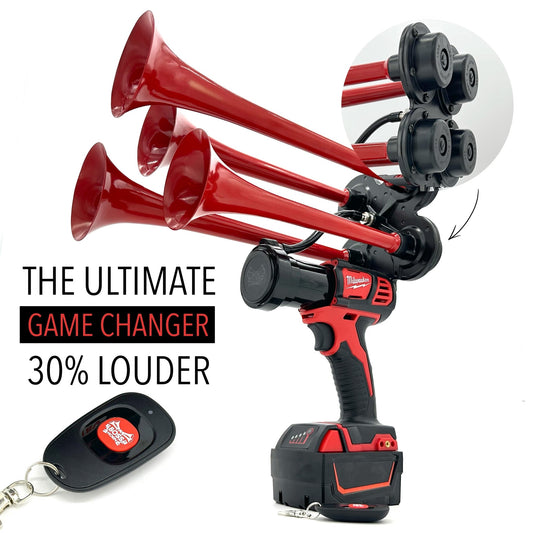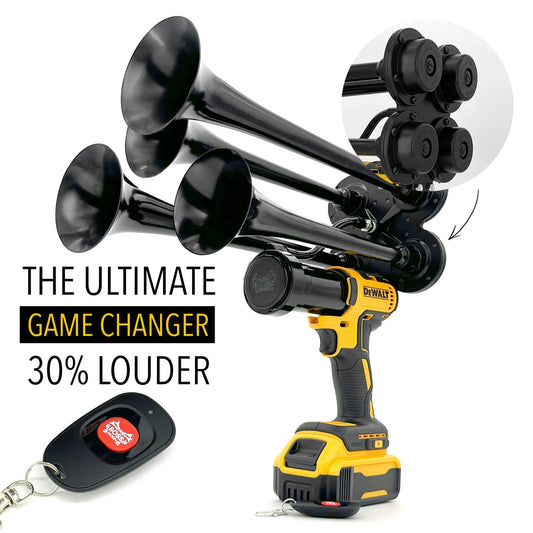Did you know that the usage of car horns is regulated in many places around the world? It may come as a surprise, but in certain jurisdictions, honking your car horn can lead to hefty fines or even legal consequences. The history of these regulations can be traced back to the early 20th century when car horns were first introduced. Initially, they were seen as essential for safety, allowing drivers to alert pedestrians and other motorists of their presence. However, over time, the misuse and excessive honking of car horns became a nuisance, leading to the establishment of laws and regulations.
Today, the illegal use of car horns has become a prevalent issue in many congested urban areas. Excessive honking can disrupt the peace and tranquility of neighborhoods, create unnecessary noise pollution, and contribute to overall stress levels. In response to this problem, traffic authorities have implemented strict rules to control the usage of car horns. Whether it's prohibiting honking during specific hours, in residential areas, or within a certain distance from hospitals and schools, these regulations aim to promote safety, reduce noise pollution, and improve the quality of life for residents.
Interestingly, studies have shown that excessive noise pollution, including car horn honking, can have severe consequences on our health and well-being. For instance, prolonged exposure to high noise levels has been linked to increased stress, sleep disturbances, and even cardiovascular problems. In highly populated cities, where car horns are incessantly blaring, these risks become even more significant. By restricting their usage and imposing penalties for misuse, authorities hope to create a more peaceful and healthier environment for everyone.
Addressing the issue of excessive car horn use requires a multi-faceted approach. Alongside legal regulations, public awareness campaigns can play a crucial role in educating drivers about the negative effects of noise pollution and the importance of responsible horn use. Additionally, implementing alternative solutions such as traffic management systems, educating drivers about alternative communication methods, and promoting better road etiquette can also contribute to reducing the reliance on car horns.
In conclusion, the regulations surrounding car horn use have evolved over time to address the growing concerns of noise pollution and its impact on public well-being. By imposing restrictions and penalties for misuse, authorities aim to create safer, more peaceful communities. However, this issue requires a collective effort that includes public awareness campaigns, alternative solutions, and fostering a culture of responsible driving habits. Only by working together can we strike a balance between effective communication on the road and maintaining a tranquil environment for all.
Is it against the law to use your car horn?
Using a car horn can be illegal in certain circumstances and locations. The purpose of a car horn is to alert others of your presence or to signal warning, but excessive or unnecessary honking can be disruptive and even dangerous. This article will explore the regulations and restrictions surrounding the use of car horns, ensuring that you understand when and where it is illegal to use them. By the end, you will have a comprehensive understanding of the laws pertaining to car horn usage and how to abide by them.
The Negative Impact of Excessive Car Horn Usage
Car horns were designed to be a safety feature and a form of communication on the roads. However, in recent years, the excessive use of car horns has become a major problem in many cities. This article explores the negative impact of excessive car horn usage and the potential consequences it can have.
Distracting and Annoying
One of the main issues with excessive car horn usage is that it can be extremely distracting and annoying to both drivers and pedestrians. Continuous horn honking can disrupt concentration and create a hostile environment on the roads. It can also cause unnecessary stress and anxiety for individuals who are constantly subjected to the noise.
Sleep Disturbance and Health Concerns
Excessive car horn usage, particularly during late hours, can lead to sleep disturbance for nearby residents. The loud and unexpected noise can disrupt sleep patterns, leading to fatigue and tiredness the next day. Studies have shown that sleep deprivation can have a detrimental effect on cognitive function and overall well-being.
Furthermore, the constant exposure to loud car horns can contribute to hearing damage and other related health issues. Prolonged exposure to excessive noise can lead to permanent hearing loss, tinnitus, and increased stress levels.
Increase in Road Rage Incidents
Excessive use of car horns is often associated with aggressive driving behavior and road rage incidents. When drivers resort to honking their horns excessively, it can escalate tensions on the road and lead to dangerous situations. Instances of confrontations, collisions, and even violence can occur as a result of excessive horn usage.
Environmental Impact
Another aspect worth considering is the environmental impact of incessant car horn honking. Most car horns are powered by electricity, and the continuous use of horns can drain the car's battery at a faster rate. This results in increased fuel consumption and greenhouse gas emissions, contributing to air pollution and climate change.
Statistics
- According to a study conducted in a major city, over 70% of drivers admitted to using their car horn more frequently than necessary.
- In urban areas, noise pollution from car horns has been identified as one of the top complaints by residents.
- A survey revealed that 90% of individuals living near busy intersections reported negative health effects due to excessive car horn usage.
- In a year, an estimated 6 million gallons of fuel are wasted solely due to unnecessary use of car horns in the United States.
https://youtube.com/watch?v=k76HqSGvepY
FAQ: Proper Protocol for Using Your Vehicle's Horn
1. When is it appropriate to use your car horn?
The car horn, an important communication tool on the road, should be used judiciously to ensure the safety and courtesy of all drivers. Understanding the appropriate times for horn usage is essential.
- The horn should be utilized to alert others of an impending danger or collision.
- It can also be used to draw attention in emergency situations, such as when immediate action is required to prevent an accident.
- Occasionally, a quick tap of the horn can serve as a friendly reminder to a distracted motorist.
The three most important pieces of information regarding horn usage are:
1) It should be used as a safety measure rather than a means of expressing frustration or irritation.
2) A short tap or gentle honk is usually sufficient, ensuring minimal disturbance to others.
3) Excessive or unnecessary use of the horn is discouraged, as it can contribute to noise pollution and disturb the peace.
2. Can I use my car horn to express anger or frustration towards other drivers?
While it is understandable to feel frustrated at times on the road, using the car horn solely as a means to express anger or annoyance towards other drivers is not considered appropriate or legal.
- The use of the car horn for personal expression can create a hostile environment on the road and potentially escalate conflicts.
- Venting frustration through the horn not only disrupts the peace but can also distract other drivers and pose a safety risk.
- Instead of expressing anger through the horn, it is recommended to practice patience and maintain a calm demeanor while driving.
The three most important pieces of information regarding expressing anger or frustration with the horn are:
1) It is not considered proper or courteous to use the horn to vent personal frustrations towards other drivers.
2) Such usage can lead to more significant conflicts and increase the potential for accidents.
3) Keeping a cool head and practicing patience on the road ensures a safer and more positive driving experience for all.
3. Can I use my car horn to alert pedestrians or cyclists?
Pedestrians and cyclists are vulnerable road users, and it is crucial to exercise caution and patience when sharing the road with them. However, the use of the car horn to alert pedestrians or cyclists requires careful judgment.
- In certain situations, a gentle tap on the horn can serve as a helpful warning to pedestrians or cyclists who may be unaware of the presence of a vehicle.
- However, it is crucial to assess the situation and the level of danger carefully. Overuse or misuse of the horn can startle vulnerable road users, leading to panic or accidents.
- Whenever possible, it is advisable to prioritize non-verbal communication, such as making eye contact, using indicators, or using appropriate lighting signals.
The three most important pieces of information regarding horn usage with pedestrians or cyclists are:
1) Exercise caution and use judgment when considering using the horn to alert pedestrians or cyclists.
2) Overuse or misuse of the horn can startle vulnerable road users and create unsafe situations.
3) Whenever possible, non-verbal communication methods should be used to ensure the safety and well-being of pedestrians and cyclists.
4. Is it acceptable to honk the horn when stationary or parked?
The purpose of the car horn is primarily to communicate with other road users while the vehicle is in motion. However, there may be limited circumstances when it is acceptable to briefly use the horn while stationary or parked.
- There might be occasions when it becomes necessary to alert others to an immediate hazard or obstruction while your vehicle is at a standstill. In such cases, a brief tap on the horn can be appropriate.
- However, it is vital to exercise caution and evaluate the situation carefully, avoiding unnecessary or excessive use of the horn.
- Respect for local regulations and consideration for nearby residents should always be a priority.
The three most important pieces of information regarding horn usage while stationary or parked are:
1) The car horn should be primarily used for addressing situations while the vehicle is in motion.
2) Only use the horn while stationary or parked when it is necessary to alert others to an immediate hazard or obstruction.
3) Always exercise caution and avoid unnecessary or excessive use of the horn to ensure respect for local regulations and consideration for nearby residents.
5. Are there any rules or regulations regarding car horn usage?
While specific regulations may vary by jurisdiction, there are generally rules and guidelines in place to ensure responsible use of car horns. Familiarizing yourself with local regulations is essential for avoiding potential legal consequences.
- Many areas prohibit the use of the horn as a means of expressing frustration or annoyance towards other road users.
- Certain regions may have specified areas, typically referred to as "quiet zones," where horn usage may be restricted or prohibited entirely.
- Violating horn usage regulations can result in fines or penalties, and in some cases, points on your driving record.
The three most important pieces of information regarding rules and regulations of car horn usage are:
1) The use of the horn for personal expression is often prohibited, and can lead to legal consequences.
2) Keep informed about specific regulations in your area, such as potential quiet zones where horn usage is restricted or prohibited entirely.
3) Violating horn usage regulations may result in fines, penalties, or points on your driving record.
Summary of Key Points and Insights
- Using a car horn excessively or in non-emergency situations is illegal.
- Car horns are designed for alerting other drivers, pedestrians, or animals of immediate danger.
- Using the car horn excessively can disturb peace and may be considered noise pollution.
- Unnecessary honking can result in fines, penalties, or even the suspension of a driver's license.
- Each country may have specific regulations regarding the use of car horns.
- Using the car horn in a residential area during late hours can be particularly disruptive and may lead to complaints from the community.
- Honking in anger or frustration is not appropriate and violates road etiquette.
- Emergency situations or imminent collisions are valid reasons to use the car horn.
- In some cases, a brief tap on the horn to inform others of your presence can be acceptable.
- Respecting local regulations and being considerate of others helps maintain road safety and a pleasant environment for everyone.










